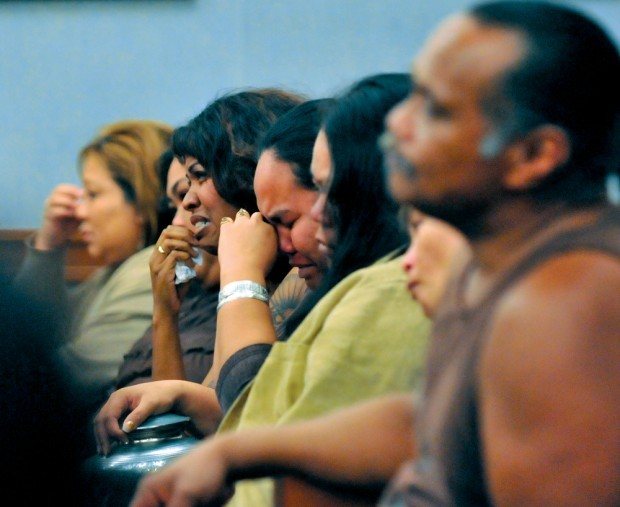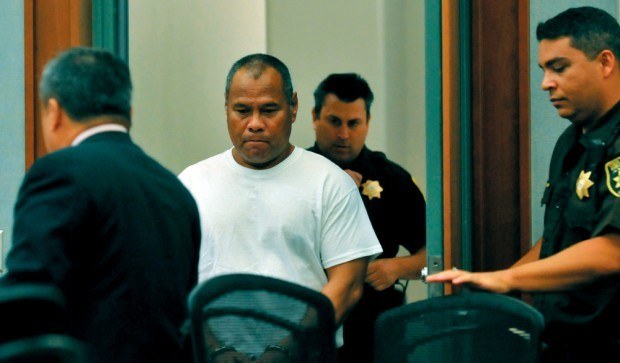LIHU‘E — The Kress Street man who killed his wife last year, stabbing her 18 times because he suspected her of infidelity, was sentenced to life imprisonment Thursday as family members packed the 5th Circuit courthouse in Lihu‘e. “I am
LIHU‘E — The Kress Street man who killed his wife last year, stabbing her 18 times because he suspected her of infidelity, was sentenced to life imprisonment Thursday as family members packed the 5th Circuit courthouse in Lihu‘e.
“I am confused. What do I call you? Do I call you ‘dad,’ or do I call you ‘the man who killed my mother?’” Raylynn Vistante, eldest daughter of Joseph Hoapili Sr. and Fredlynn Hoapili, said in court prior to the sentencing.
Calling her father a “coward” for stabbing his wife in the dark early in the morning of March 3, 2009, Vistante said while she loves him and never hated him, she attended the hearing to seek justice for her mother.
Asked by 5th Circuit Chief Judge Randal Valenciano if he wanted to make a statement before being sentenced, Hoapili first hoped to address his family directly but was told he could not turn around to face them and would instead address the court while they listened.
“I regret every single day what I did, and I have to live with this pain for the rest of my life,” he said. “I’m truly sorry for what I did.”
Deputy Public Defender John Calma said Hoapili was originally defiant after the incident, and at one point asked for a transfer away from Kaua‘i due to the “heinous” nature of the offense, but has been a “model inmate” in the last year and has realized that what he did was “horrible and wrong.”
Calma said the change in attitude “will not mitigate the severity of his crime,” and Hoapili cannot “un-ring the bell” for what happened last March 3, but read a statement from Fredlynn Hoapili herself in asking for leniency for her murderer.
In 2008, when Joseph Hoapili Sr. was sentenced by Valenciano to 15 days in prison for third-degree promotion of a dangerous drug, his wife submitted a letter to the court calling her husband a “very loving man” and asking that the family’s bread-winner not be incarcerated for long, despite a long history of domestic violence in the Hoapili household.
Prosecuting Attorney Shaylene Iseri-Carvalho said that history, which included bruises and one incident with a telephone cord, came to a head when the 51-year-old Joseph Hoapili Sr. killed his wife of 35 years by stabbing her 18 times, 14 in the heart area. The attack began while she lay asleep, rendering her unable to defend herself and able to muster only a desperate plea as her last words: “John help, John help.”
The Hoapilis’ adult son John, asleep in a nearby room, broke into his parents’ locked bedroom and saw them struggling as a knife — a large kitchen blade the family had used to cut meat during cooking — was pushed into her chest.
In the preliminary court hearing, Kaua‘i Police Department Detective Joseph Adric, the lead investigator on the case, testified that Hoapili told him that the couple had argued earlier in the night about his suspicion of her infidelity. Iseri-Carvalho said Thursday that an extensive investigation after the murder did not turn up any evidence of an affair.
In the days prior to the murder, Joseph Hoapili Sr. had been following his wife around as she went to work as a bus driver for Akita Enterprises and to a second weekend job at Kaua‘i Palms, Iseri-Carvalho said, because he did not want her to go to the airport and leave. Friends told investigators they noticed a change in Fredlynn and that they could “feel the fear.”
“Do you call that ‘love’ or do you call that ‘obsessed?’” Vistante said.
“The brutality of your actions … was a picture of an obsessed person out of control,” Valenciano said before announcing Hoapili’s sentence. The judge told Hoapili that the incident would leave an impact across generations in his family, and said, “you’re going to be a black mark in that line.”
Initial reports implied Hoapili was high on methamphetamine at the time of the incident, but blood tests indicated he was not under the influence of drugs or alcohol at the time, attorneys said.
“This was just an intentional act carried out in a brutal nature,” Valenciano said. “You know, Mr. Hoapili, I’m not going to wish you good luck. I normally do, but not in this situation.”
Maximum sentence?
Earlier, Vistante read a letter from some family members asking that her father be given a life term without the possibility of parole, but the terms of the sentence handed down by Valenciano make Hoapili, a repeat offender with a prior drug conviction, eligible for possible release after he serves a mandatory minimum of 10 years in prison.
Section 706-656 of the Hawai‘i Revised Statutes states the maximum prison term for a person convicted of second-degree murder — “intentionally or knowingly caus(ing) the death of another person,” according to state law, the charge Hoapili pleaded guilty to in January — is life in prison with the possibility of parole.
However, HRS Section 706-657 adds that a person convicted of second-degree murder may be sentenced to a life term without parole “if the court finds that the murder was especially heinous, atrocious, or cruel, manifesting exceptional depravity,” meaning “a conscienceless or pitiless crime which is unnecessarily torturous to a victim.”
Section 706-657 would require that an additional hearing, between conviction and sentencing, be initiated by either the county Office of the Prosecuting Attorney or the court itself.
Days after the murder, Iseri-Carvalho sought elevated bail for Hoapili because his alleged crime was “heinous, atrocious and cruel,” and former First Deputy Prosecuting Attorney Lori Wada said the state would ask the court to impose an enhanced sentence of life imprisonment without parole.
It is unclear when or why the enhanced sentence was taken off the table.
Court minutes from Hoapili’s Jan. 11 change-of-plea hearing show that the judge agreed the case was “not subject to an extended term of imprisonment,” a term that generally applies to the doubling of maximum prison terms when a defendant is found guilty of multiple felony offenses, which does not apply in the Hoapili matter. The term “enhanced” is not in the minutes, which are a court summary of the proceedings and are not a verbatim transcription.
While it is possible that the enhanced sentence was ruled out as part of the plea agreement, messages left for Iseri-Carvalho Thursday afternoon seeking clarification on the matter were not returned.



